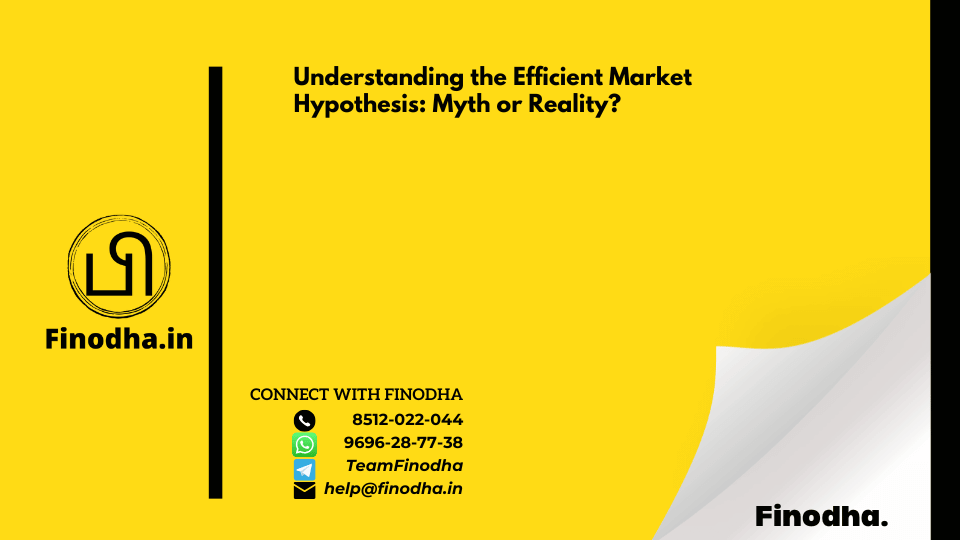Important Keyword: Efficient Market Hypothesis, Market Efficiency, Active vs Passive Investing, Behavioral Finance.
Table of Contents

Introduction to the Efficient Market Hypothesis
The Efficient Market Hypothesis (EMH) is a crucial concept in the field of finance that asserts that financial markets are “informationally efficient.” This implies that stock prices at any given time incorporate all available information, reflecting the true value of securities. Consequently, under the EMH framework, it is posited that one cannot achieve returns that exceed average market returns on a risk-adjusted basis, as any new information that may affect stock prices is instantaneously absorbed and reflected in those prices. This leads to the conclusion that neither technical nor fundamental analysis can yield consistently superior returns, as the markets have already adjusted to new data.
The origins of the Efficient Market Hypothesis can be traced back to studies conducted in the 1960s by financial economist Eugene Fama. Fama’s pioneering work laid the groundwork for what would later be recognized as the three forms of market efficiency: weak, semi-strong, and strong. The weak form suggests that stock prices reflect all past market data; the semi-strong form extends this idea by asserting that stock prices also account for all publicly available information; and the strong form posits that all information, public and private, is already integrated into current stock prices. This framework has important implications for portfolio management, investment strategies, and risk assessment.
The significance of the Efficient Market Hypothesis in finance cannot be overstated. In an efficient market, investment strategies based on market anomalies or the pursuit of arbitrage opportunities are rendered ineffective. As such, the EMH serves as a foundational principle for many financial models and theories, influencing both academic research and practical investment approaches. Understanding the EMH is essential for both investors and scholars, as it challenges conventional views on market behavior and guides decision-making processes in the face of economic uncertainty.
The Pillars of EMH
The Efficient Market Hypothesis (EMH) is a cornerstone concept in the realm of finance, asserting that stock prices are reflective of all available information at any given time. This hypothesis is built upon three distinct forms: weak, semi-strong, and strong, each contributing unique perspectives on the market’s efficiency and the implications for investors.
The weak form of EMH posits that all past trading information is already reflected in stock prices. This means that historical price movements and volumes cannot be used to predict future price movements, as any patterns that may once have been recognized are already accounted for in current prices. Consequently, this form implies that technical analysis, which relies on past market data, is largely ineffective in generating consistent profits.
Next is the semi-strong form, which asserts that stock prices reflect not only past trading data but also all publicly available information. This includes financial statements, news articles, and other relevant public disclosures. The implication here is that neither fundamental analysis nor technical analysis can consistently yield excess returns since the market swiftly absorbs and incorporates new public information. Investors are cautioned against assuming that they can gain an advantage by merely staying informed about public developments.
Finally, the strong form of EMH extends the notion of efficiency to encompass all information, both public and private. Under this form, even insider information would not provide an unfair advantage, as stock prices would still adjust to reflect this information ahead of time. This perspective suggests a highly rigorous market efficiency standard, where no investor can consistently outperform the market, regardless of the information they possess.
Together, these three forms of EMH reinforce the idea that markets are efficient, with prices instantaneously adjusting to reflect new information. This understanding sets the backdrop for evaluating the practical implications of EMH on various investment strategies, offering insights into the limitations and opportunities available to investors in the ever-evolving financial landscape.
The Controversy Surrounding EMH
The Efficient Market Hypothesis (EMH) has sparked considerable debate among economists, investors, and academics since its inception. Proponents of EMH argue that financial markets are efficient, meaning that stock prices reflect all available information at any given time. These advocates assert that since it is impossible to consistently achieve higher returns than the overall market without assuming additional risk, active trading and stock-picking strategies are futile. The belief that markets respond quickly to new information and adjust prices accordingly forms the crux of the support for EMH.
However, critics contend that markets are far from perfect and can indeed display irrational behavior. They argue that various psychological factors influence investor decisions, leading to price anomalies that contradict the tenets of EMH. Behavioral finance research highlights tendencies such as overreaction and underreaction to news, which can cause stock prices to deviate from their intrinsic value. For instance, during economic bubbles or crashes, stock prices tend to move dramatically based on investor sentiment rather than underlying fundamentals, suggesting that not all information is accurately reflected in market prices.
This divergence from the EMH principles raises valid concerns about the reliability of market efficiency. Critics emphasize that there are numerous instances where significant market events—such as the dot-com bubble in the late 1990s and the financial crisis of 2008—demonstrate a disconnect between stock prices and fundamental values. These events illustrate how factors beyond mere information dissemination can influence market dynamics, supporting the view that sometimes, the markets do fail to act rationally.
As the debate continues, it is clear that while EMH presents an influential framework for understanding market behavior, its applicability may vary across different contexts. The discussions surrounding EMH reveal the nuanced and complex nature of financial markets, inviting ongoing exploration and analysis.
EMH and Investment Strategies: Active vs. Passive Investing
The Efficient Market Hypothesis (EMH) significantly shapes the discourse surrounding investment strategies, particularly concerning the dichotomy between active and passive investing. According to EMH, asset prices fully reflect all available information, implying that consistently outperforming the market through active management is unfeasible. This principle strongly advocates for a passive investment approach, suggesting that investors may achieve better long-term returns through low-cost index funds rather than attempting to select individual stocks or timing the market.
Active investing involves selecting specific securities in an effort to outperform the average market returns. Active managers conduct in-depth research and analysis to identify undervalued stocks or trends. However, EMH posits that any potential benefits from such analysis are already priced into the securities, thereby diminishing the likelihood of success. Consequently, while active management may appeal to those who believe in the potential to outperform, it often leads to higher fees and costs, which can erode returns over time.
In stark contrast, passive investing focuses on tracking a market index, such as the S&P 500, with the belief that the market’s overall performance will naturally yield favorable returns over the long haul. This strategy is grounded in EMH, as it avoids the high costs associated with active management while benefiting from the market’s historical trends. Passive investors typically incur lower expenses due to fewer transactions and lower management fees, making this approach particularly appealing in light of EMH.
Ultimately, as research emerges and reinforces the principles of EMH, investors are encouraged to consider the long-term benefits of passive investing. By embracing low-cost index funds and refraining from chasing potentially unreliable active managers, investors can cultivate a more robust portfolio that aligns with EMH’s core tenets. The choice between active and passive investing thus encapsulates a critical debate in financial strategy, underscored by the foundational theories of market efficiency.
Case Studies: Evidence Supporting EMH
The Efficient Market Hypothesis (EMH) posits that asset prices reflect all available information, leading to the assertion that consistent profits through active management are unattainable in the long run. Numerous case studies provide empirical support for this hypothesis, highlighting the performance disparities between active and passive investment strategies. One prominent analysis by Morningstar illustrates the considerable performance gap between these two approaches over extended periods.
According to Morningstar’s findings, during a recent ten-year period, only 18% of active managers outperformed their respective benchmarks after fees and expenses. This statistic signifies a stark contrast against the backdrop of passive management, which typically offers lower costs and a performance closely aligned with the market. The passive funds consistently exhibited lower volatility and superior long-term returns compared to their active counterparts, underscoring the practical implications of the EMH.
Furthermore, a comprehensive study by the SPIVA (S&P Indices Versus Active) report revealed that over a longer timeframe, such as 15 years, 82% of active fund managers underperformed the S&P 500 index. This robust data supports the argument that the average investor might be better served by passive investment strategies rather than attempting to time the market or pick individual stocks. The persistent trend of underperformance amplifies the conclusions drawn from EMH, suggesting that acquiring information and acting on it does not guarantee superior gains.
In addition, as markets become increasingly efficient due to the proliferation of information and analytical tools, the challenge for active managers becomes even more pronounced. The case studies bolster the credibility of the EMH, proving that in many instances, the market delivers more reliable returns through passive strategies, thereby validating the theory’s relevance in contemporary finance.
Real-life Implications of EMH for Indian Investors
The Efficient Market Hypothesis (EMH) presents significant implications for Indian retail investors, particularly in terms of how they approach stock market investments. The theory posits that asset prices reflect all available information, making it challenging to achieve returns surpassing the market average consistently. This notion can influence investment strategies among Indian investors, especially in the vibrant yet volatile context of India’s stock markets.
For instance, Indian retail investors often gravitate towards mutual funds as a primary investment vehicle, drawn by the expertise of fund managers to outperform the market. However, under the EMH framework, investors must recognize that mutual fund performance may be limited by the efficiency of the markets in which they operate. In such a scenario, they should focus on selecting funds that employ a passive management approach, such as index funds, rather than those aiming for active management, which may not consistently outperform their benchmarks after accounting for fees.
Additionally, the implications of EMH encourage Indian investors to adopt a long-term investment perspective. The belief that markets are generally efficient suggests that attempts to time the market or make short-term speculative investments can lead to suboptimal results. Consequently, it is advisable for investors to focus on fundamental analysis and maintaining a diversified portfolio that aligns with their risk tolerance and investment horizon.
Moreover, the EMH challenges the notion of insider trading being a viable strategy for Indian investors. As the hypothesis suggests that all relevant information is reflected in stock prices, even insider knowledge may not guarantee success. Therefore, retail investors in India should be more inclined toward transparent practices and ethical investment strategies, reinforcing the importance of adhering to regulatory frameworks.
Ultimately, while the EMH offers a theoretical backdrop to market behavior, its real-life implications serve as a crucial guide for Indian investors navigating the complexities of stock markets. Understanding these nuances can empower them to make informed, strategic decisions that align with their financial goals.
Advantages and Disadvantages of the Efficient Market Hypothesis
The Efficient Market Hypothesis (EMH) posits that financial markets are “informationally efficient,” meaning that prices of securities reflect all available information. This theory has both advantages and disadvantages that merit careful examination.
One notable advantage of EMH is market efficiency, which suggests that it is impossible to consistently achieve higher returns than the average market return on a risk-adjusted basis. This principle underpins the argument for passive investment strategies, emphasizing that, rather than attempting to beat the market, investors can benefit from a more straightforward approach by investing in index funds and diversified portfolios. The adoption of passive strategies tends to lower investment costs and reduce the burden of active management, which may lead to better long-term returns for investors.
However, the Efficient Market Hypothesis is not without its criticisms. One major disadvantage of EMH is its failure to account for behavioral finance elements. Behavioral finance examines the psychological influences and biases that affect investor behavior, indicating that markets can be influenced by irrational actions and emotions. This criticism highlights that asset prices can diverge from their intrinsic values due to factors such as investor sentiment and herd behavior, leading to perceived market anomalies.
Moreover, empirical evidence sometimes contradicts EMH, illustrating instances where certain stocks or securities have consistently outperformed the market. Such anomalies challenge the validity of EMH and suggest that there are potential opportunities for active traders to capitalize on mispriced securities, thus raising questions about the hypothesis’s real-world applicability.
In summary, while the Efficient Market Hypothesis offers a structured framework for understanding market behavior, its advantages and disadvantages necessitate a nuanced approach, acknowledging both the benefits of market efficiency and the complexities of investor psychology.
Common Misconceptions About EMH
The Efficient Market Hypothesis (EMH) is often misunderstood in various aspects, leading to prevalent misconceptions regarding its implications in the financial markets. One common myth is that EMH posits that markets are always rational. However, this interpretation overlooks the complexity of human behavior and psychological factors that often drive market movements. EMH suggests that financial markets reflect all available information at any given time, but it does not claim that market participants are devoid of irrational behavior or emotional biases. Instead, it indicates that any inefficiencies are quickly corrected as new information becomes available.
Another frequent misconception is the belief that EMH renders active investing futile. While EMH proposes that consistently outperforming the market is challenging due to the efficiency of information dissemination, it does not imply that all forms of active investing are worthless. Investors may still seek to exploit transient inefficiencies or capitalize on unique insights requiring skills beyond mere market timing or selection. Furthermore, many active investors focus on specific sectors or niches where their knowledge can provide a competitive advantage, demonstrating that EMH does not invalidate the existence of successful active investment strategies.
Additionally, EMH is often conflated with the idea of complete predictability in market behavior. While EMH states that security prices reflect all known information, it does not guarantee future price movements or eliminate the possibility of unforeseen events impacting the market. Investors still face uncertainties stemming from variables beyond the scope of available data. Therefore, a nuanced understanding of EMH is essential to appreciate its actual implications for investment strategies and market behavior without misinterpreting its core principles.
Conclusion and Key Takeaways
The Efficient Market Hypothesis (EMH) has been a subject of extensive debate within the finance community, raising questions about the nature of market efficiency. Throughout this article, we explored three forms of market efficiency: weak, semi-strong, and strong, each presenting a different perspective on how information is reflected in stock prices. The discussion illustrated that while EMH posits that financial markets are efficient, real-world anomalies and behavioral finance often challenge this assumption.
Understanding EMH is crucial for investors as it influences various investment strategies. If markets are indeed efficient, as EMH suggests, then efforts to outperform the market may be futile, leading to a preference for passive investment strategies such as index fund investing. Conversely, if the markets are not entirely efficient, opportunities for arbitrage exist, which can be leveraged by savvy investors. This duality presents a critical context that every investor should consider when formulating their investment approach.
As we have seen, behavioral biases can affect market dynamics, leading to scenarios where securities may become mispriced, albeit temporarily. Thus, an awareness of market efficiency can empower investors to recognize when they may obtain a competitive advantage through informed decision-making. It is advised that investors remain vigilant and adaptable, staying updated on market conditions while considering their risk tolerance and investment horizon.
In conclusion, the Efficient Market Hypothesis offers valuable insights into market behavior despite its limitations. Investors are encouraged to widely interpret the principles of EMH while remaining cognizant of both its implications and the counterarguments that exist. By doing so, they can formulate more effective strategies for navigating the complexities of financial markets.
Download Pdf: https://taxinformation.cbic.gov.in/




